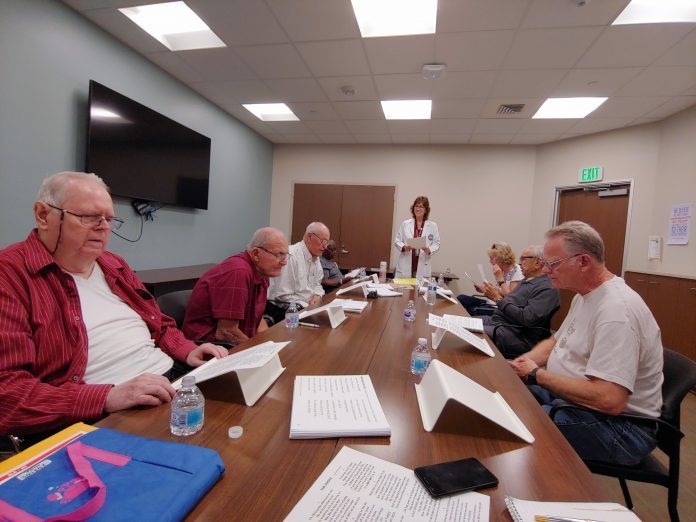
Parkinson’s victims learn to reclaim their voices
Although most of this class is retired, they practice speaking as though their lives depended on it. In many ways, what they learn here does matter and will make a difference in the everyday quality of their lives.
They are the “Loud Crowd” and each of them are a victim of Parkinson’s Disease. Though the disease has slowly taken from them the ability to be understood, this pioneering program being administered at Los Alamitos Medical Center is giving them a chance to fight back.
“This (Loud Crowd) is a program to give victims of Parkinson’s a chance to reclaim their voices,” according to Speech Language Therapist Lynn Gallandt (M.S. CCC-SLP), who teaches the small class twice weekly.
“I’m proud of you for not let Parkinsons’ take your voice,” Gallandt tells her class as she coaches them through weekly speaking drills. While Parkinson’s Disease affects the brain’s neurochemical pathways in a patient’s brain, Gallandt says the underlying muscle system in patients is very much intact.
As the disease progresses, she says, patients begin to find their voices weaken, eventually softening to the point of not being understood. They begin to speak softly and for some, not at all.
Twice weekly, this group of about 10 victims of Parkinson’s Disease sit around a conference room table as Gallandt puts them through paces that teaches them to use and train the facial muscle which they can still control.
“Let’s say it again,” she tells the group, “this time act like you’re at a football game these phrases,” she said. “Let’s make it a little stronger.” By exercising specific muscle patterns, their voices become stronger, louder and better understood.
“For me, the program has been a tremendous help,” said patient Samuel Samuel Sebabi. “My wife would urge me to go out. I found every excuse in the book not to go. I found myself getting stuck on words. Then I started losing my voice. After just four sessions here,” he said, “I knew I was in the right place.”
Actually, the Loud Crowd is a registered regimen developed by the nonprofit Parkinson’s Voice Project in Richardson, Texas. Patients can only enter the program once they’ve completed the “Speak Out” portion of the treatment, says Gallandt.
“They lose the ability to do things that once happened automatically,” said Gallandt, like blinking, swallowing, speaking and sometimes walking.
Lou Belanger, 91, a longtime factory manager and yes, an aspiring singer, said “I was having trouble understanding what I was saying. I thought I was the one needing hearing aids,” he said before realizing his voice was slowly, softly disappearing.
The class continues as Gallandt urges the Loud Crowd to “say it with intention. “You deserve for people to hear you. You deserve people to understand you.”
As they speak, she focuses them on using the muscles in their faces that have not been affected by Parkinson’s that allow them to speak at near normal capabilities.
She teaches them to “say it with purpose” and teaches them breathing exercises to replace the automatic neurochemical responses that Parkinson’s has taken from them.
For many attending the class, a large majority of whom had virtually given up socializing, they are now enjoying life again. Gallandt says she enjoys watching the transformation and hopes the program will expand to help others. She will soon be traveling for additional training, but Gallandt said results thus far are very promising.
“It’s given them a voice again,” she said, and that is “a wonderful gift.” And said Belanger in his thick, northeastern accent, “I’ve always got something to say.”




